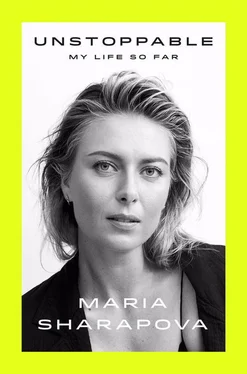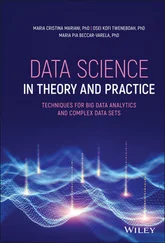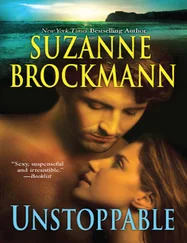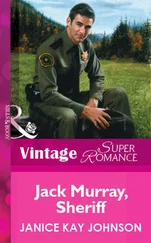We began preparing for the hearing right away. I was getting my papers and records in order, and researching meldonium. I wanted to know everything about it. Meanwhile, I had been provisionally banned from competition. I was already missing tournaments: Indian Wells, Miami. There was no way to predict the future. In the moment, it felt like I’d never make it back, yet I kept training. This was not only for my physical health but for my mental health, too.
One afternoon I found myself really struggling at practice. Sven sat me down and said, “Maria, when you go to that hearing, I want you to be the fittest person in that room.”
I gave him a look. “Well, that’s not going to be difficult.”
“You know what I mean,” he told me. “I want you to be so strong physically and mentally that they can’t hurt you.”
In those weeks, I worked as hard as I ever have. I could’ve gone out, that June, and played at the French Open. I was in that kind of shape. I practiced on a clay court behind someone’s house in Palos Verdes every day. Normally, I practice on a side court at a country club. It’s the most private court I can find, but it’s still visible to everyone walking by. What I needed now was privacy. But there really was no escape from my own terrible thoughts. I was afraid to look at my phone, but I could not keep my eyes away. It was like the ring that ruins Gollum in The Lord of the Rings. It was “my precious.” It seemed to vibrate whenever I looked at it—it flew into my hand whenever I thought about it. Who knew what terrible news I was going to get next? I was afraid when Max’s name popped up—my heart was in my mouth—because “what happened now?” And yet I needed to talk to him. All the time. His calls caused anxiety that only his calls could relieve. In the end, I did not even know what I was afraid of. I just knew that I was afraid. All the time.
The first hearing was in June in an office tower in London. I remember waking up in the Rosewood hotel near Covent Garden. The bed was so big and comfortable, and for a moment I was happy because I had forgotten why I was in that city and in that hotel and in that bed, and then I remembered. Downstairs, they asked if my family had come with me and I laughed. My family hardly ever came when I was playing in a tournament. Why would they come for my trial? The hearing was held in a kind of boardroom. On our side, it was me, Max, and my two lawyers. On their side, it was ITF’s antidoping head and their lawyers. We gave our testimony to all three members of the panel.
The whole process was set up to make me fail. All three members of the panel had been selected by the ITF. The chairman of the panel had actually been copied on the original e-mail that set off the whole nightmare. In other words, the case, brought by the ITF, would be decided by the ITF, too. How can such a hearing be impartial, fair? Simple answer: it can’t. That’s why my lawyer told me not to expect justice or even a fair outcome in this round. We have to lose here, he said, so we can get to the next panel, where you actually will get a fair hearing. I was shocked. “You mean I’ll have to go through this twice?” I couldn’t stand the thought of it. I had to testify for hours and hours. Then, when I wasn’t testifying, I had to sit and listen to the other side call me a doper and a cheat. But there was one thing that gave me confidence. I knew that I was telling the truth. I did not try to claim there had been a mistake on the test or that I had not taken the supplement or had taken it only before the ban. I admitted to taking the supplement in January 2016. But it was a mistake. Wasn’t that obvious? I didn’t know the supplement had been banned, or that there was any issue with it. It did not enhance my performance or make me a better player. I had been told to take it for my heart, so I took it for my heart. As far as violating a ban, that was just a stupid oversight. But the ITF took a hard line, delivered in an aggressive tone. What a sad, infuriating joke. Why were we even fighting? I screwed up. I didn’t do enough to check the revised prohibited list. But they screwed up, too. They should’ve been much clearer about the changes to that list. They should’ve flagged the ban, shouted the change to the hills. How about at least making some phone calls to some agents and giving the players an advance warning? Instead, they expected a player to comb through that long list and find the change. Considering meldonium was on the monitoring list throughout 2015, they should have known it was in my system. I’d been giving urine and blood samples for years. Why not let me know what was happening? It seemed like a setup, a trap. Not a day went by when I did not wonder if someone was trying to do me in.
Despite all that, I came away from the first hearing optimistic. I thought I’d explained myself well. The truth seemed so clear. Which is why the decision, and the report, which was issued a few weeks later, came as such a shock. The three-member panel agreed that I had not intended to violate the rules—that it was indeed a mistake. Those lawyers admitted there was no intent to cheat on my part. I was happy about that, but the rest of it? The report? It was just a screed of lies, an endless attack on me. They killed me, ripped me to pieces. It was so opinionated, so brutal, and so mean. I was horrified by it, disappointed and stunned. The ban was set at two years. When the word came down from Mount Olympus, I drove to Ojai, California. My team and I rented a home there. It felt good to be somewhere beautiful when something bad was happening. But it hurt badly. Two years? OK, it was not the max, it was not four years, but two years? Would I be able to come back after a two-year hiatus? When I’d be thirty-one years old? I felt like a ninety-year-old man who gets sentenced to ten years in prison.
My lawyer called me aside and explained. He said, “Look, this panel is not really the one that matters—it’s prejudiced and unfair. Famously unfair. That’s why so many of their decisions have been reversed on appeal. The last six have been overturned! But that’s the process. We needed this ruling to get to the next panel, the one that really decides. So stay strong, and keep training and be optimistic. I promise you: this will not be the last word.”
And so we began preparing for the second hearing, which would be heard by the CAS, the Court of Arbitration for Sport. The CAS is an international quasi-judicial body first established by the Olympic Committee in 1983, but its role has grown. It’s become the court of last appeal for cases like mine. It’s a truly neutral body. I hoped to clear my name at the CAS, but of course a tremendous amount of damage had already been done. Many of my sponsors distanced themselves from me and my ranking was dropping by the week. I’d miss the Rio Olympics. And my reputation? Look at the damage that was being done even before I got to make my case. The trial felt like the punishment. In May, in New York, as I was coming out of the Bowery Hotel, catching a car to my first Met Gala, a crazy man started screaming at me in the street about steroids. A few weeks later, while I was talking to a landscaper in front of my house in L.A., a car drove by and a boy who sounded no more than fourteen years old shouted, “Dope ho! F.U., Maria!” How did I feel? Bad for the landscaper! He was nice and seemed so upset and embarrassed that I just wanted to tell him everything would be OK.
Welcome to my life. What a nightmare.
In the meantime, I kept training. During one practice, I got frustrated. “Why are we doing this?” I asked Sven. “What are we training for?”
Right then, I realized I needed to do something else, something more. This was a question of sanity. I have always been interested in business, so I enrolled in a two-week summer program at Harvard Business School. I worked with brilliant professors and students, most of whom couldn’t care less about my tennis problems. They made me feel normal. And stupid. That was a relief. Just to be out of that pressure cooker. Just to be raising my hand and asking questions. It was a vacation from my trouble. I learned so much in that program, and it was fulfilling—this notion that I was not wasting time. Though I was going through this ordeal, I was still growing, still trying to become a better version of myself. When that was over, I wrote an e-mail to Adam Silver, commissioner of the NBA. I’d never met Adam, but I had long admired his work. I told him about my respect for the league, the players, and the teams, the way that the product was promoted and presented to the public. He invited me to New York, where he set me up with a kind of internship. For three days, I shadowed him, watching Adam Silver do his job, learning. We did a lot of talking; he gave me his thoughts on my situation. He didn’t need to or have to but he did. I cannot tell you how comforting it was. Not just the internship itself but the very fact of it. I felt like the whole world was against me, that I’d become an outcast, a pariah. Looking back on it, the fact that Adam Silver brought me in and showed me around and told the world, by bringing me in, that there was in fact no shame in working with Maria Sharapova—it was a tremendous feeling. All I needed at the time were small doses of happiness that added together and got me through this. I’m a much better athlete, much better person, when I’m inspired. And those experiences inspired me. They made me feel good about myself, like I was learning and growing.
Читать дальше












